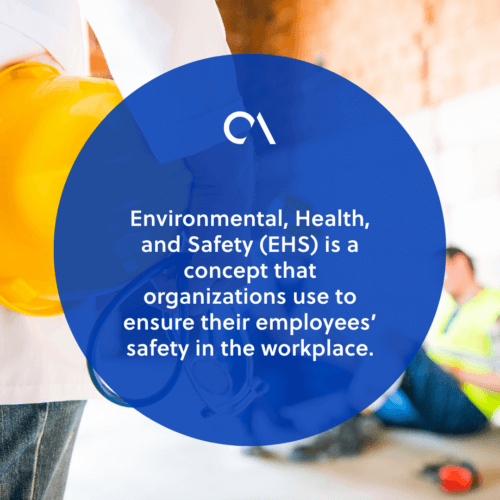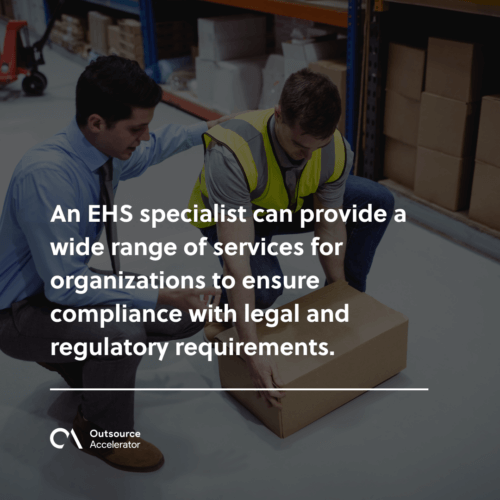The role of an EHS specialist in ensuring workplace safety

Even as many corporations worldwide adopt remote work, there’s still a different vibe about coming into the office.
Of course, the office should be a safe and productive place to work, and that’s where the EHS specialist comes into play. These guardians of workplace safety ensure that employees can move around and get the most out of working in their office.
Defining EHS
Environmental, Health, and Safety (EHS) is a concept that organizations use to ensure their employees’ safety in the workplace. It manages the particular risks associated with a business, combining occupational health, safety management, and environmental protection.
The main purpose of the EHS concept for organizations is to establish a safe environment so that workers can do their jobs without risk of injury.

What is an EHS specialist?
An EHS specialist is trained to identify potential hazards in the workplace. These specialists work to devise ways to reduce the danger of illness or injury.
They have specialized knowledge and skills in environmental, health, and safety matters. A large part of their role is to develop policies that protect employees from any threats in the physical workplace setting.
An EHS specialist may also be referred to by the following titles:
- Safety officer
- Environmental manager
- Occupational health and safety professional
- Industrial hygienist
Duties and responsibilities of an EHS specialist
The duties and responsibilities of an EHS specialist depend on the size and nature of the company.
In general, these include the following:
- Developing and implementing health and safety policies for an organization
- Identifying and addressing potential hazards in the workplace
- Creating a risk management framework
- Implementing measures to ensure compliance with local, state, and federal regulations
- Planning emergency responses to accidents or incidents that may occur on-site in your organization’s facilities
- Conducting routine inspections to ensure the facility is operating within established safety parameters
- Providing training to employees on how to comply with safety requirements
- Managing and evaluating safety programs to prevent accidents, injuries, or health problems
- Ensuring that all necessary equipment is in place and working properly
- Analyzing data on injuries, illnesses, or exposures that occur in the workplace
- Investigating any incidents or complaints involving employee health or safety issues
Key skills of an EHS specialist
As the point-person for environmental, health, and safety compliance issues, the EHS specialist must possess the following skill areas:
Safety and health knowledge
An EHS specialist must have knowledge of safety and health regulations and how to apply them to the working environment.
They need to understand the relationship between workplace hazards and their effect on workers’ health. They must also have experience with risk management should any incidents occur.
Technical skills
EHS specialists must possess some technical skills in areas such as electrical and mechanical systems, fire protection, telecommunications, and security systems. It’s part of their job to observe what works and point out any potential risks in faulty machinery.
They also need these technical skills for their office work and tasks that support business goals.
Communication and interpersonal skills
An EHS specialist needs good communication skills to interact effectively with employees about safety management. They should be able to explain complex issues, present findings and recommendations, and take note of any suggestions and complaints.
EHS specialists also frequently deal with senior management, so professional interpersonal skill is also a must.
Analytical and critical thinking
The ability to analyze data and make sense of it is an essential skill for an EHS specialist. This skill helps them identify trends in data and use that information to drive decisions to improve workplace conditions.
EHS specialists must be able to think critically about situations and tailor policies depending on the industry and company nature. They should evaluate new technologies and workplace implementation processes, using available data to determine safety.

How an EHS specialist can benefit your workplace
An EHS specialist can provide a wide range of services for organizations to ensure compliance with legal and regulatory requirements. Aside from conducting inspections, these experts may also be called on to manage audits, develop programs, and prepare reports.
It’s more important than ever to ensure that your employees are safe. It’s not just about liability but productivity. The right EHS specialist will make your workplace a safer and more comfortable place for everyone.
By working with an EHS specialist, you get the following benefits:
- An evolved approach to health, safety, and environmental management in line with changing legislation.
- An opportunity to develop your existing risk management processes, risk assessments, and emergency response plans.
- Identification of gaps in your current controls and the means to develop appropriate solutions to address them.
- An overall more effective employee training program for health, safety, and environmental issues.

Challenges and future trends in EHS
Safety has always been an important issue in work. In recent years, several new trends have risen, particularly in the use of technology, to redefine what a safe working environment is.
It’s the challenge of EHS specialists to adapt to these trends and ensure safety even as the world evolves.
A few of these EHS trends include:
Ergonomics
The study of ergonomics, which considers psychology when designing places and systems, is core to EHS. An EHS specialist should take note of emerging studies in the ergonomics field to recommend better safety strategies.
Mental health focus
As more attention is given to mental health, it’s also worth noting any hazards in your workplace that could contribute to this.
An EHS specialist looks at safety from all angles, and in the future, this may increasingly include mental health for positive work culture.
Robotics and AI
It should come as no surprise that artificial intelligence is beginning to step into the EHS sector. Robots can provide efficiency and reduce risk, while AI can provide data with predictive analytics, monitoring, and automation.







 Independent
Independent




